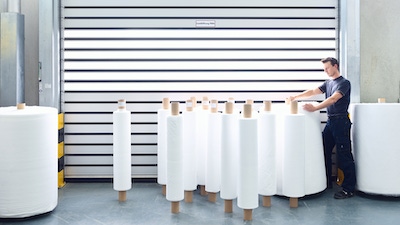April 1, 2020

German machinery manufacturer Reifenhäuser Reicofil has temporarily converted two of its test plants due to the corona pandemic to produce meltblown nonwoven fabric for face masks. The lines at its nonwovens technology center in Troisdorf, Germany, otherwise exclusively used for R&D and customer trials, are turning out meltblown nonwoven fabric for up to one million face masks daily.
|
German-made meltblown nonwoven fabric will be shipped to Vietnam for conversion into face masks. Image courtesy of Reifenhäuser Reicofil. |
Reifenhäuser could not locate any German or European producer for further processing into face masks and says the nonwoven fabric is going to a Vietnamese manufacturer for conversion to the final product. The COVID-19 pandemic has highlighted the dependence of Western nations on Asian countries, particularly China, for personal protective equipment (PPE). However, Reifenhäuser continues to look for opportunities to strengthen local supply during this crisis. The company is in close contact with associations, authorities and other companies.
To become more independent from China in the area of medical supply, countries are increasingly considering setting up their own production according to Reifenhäuser Reicofil, which now supports countries and other investors to implement such projects as speedily as possible by shortening the delivery time to only 3.5 months for meltblown lines to produce the crucial middle material layer for face masks.
The first contract with the new delivery time has already been concluded. The 1.6-meter-wide Reicofil Meltblown line is scheduled to start operation in August 2020. With an annual output of 550 tonnes, the plant will produce H99 filter material for up to 1.8 million face masks a day.
Bernd Kunze, CEO of Reifenhäuser Reicofil, explains the current strategy as follows: “We have considered what contribution we can make in this crisis. This is of course mainly the fast delivery of meltblown lines to build up additional capacities. We have drastically reduced our delivery times here. But we also wanted to provide support at shorter notice. Until the currently lacking capacities are built up, we are stepping in with the test plants. Not using this capacity now would be irresponsible in our view.”
Kunze adds that material for other medical protective clothing can also be produced at short notice: “We assume that protective suits and hoods will also become scarce. We are happy to offer our help here as well. One of our pilot lines can produce the corresponding material, an SMS nonwoven, at short notice. In the medium term, however, we should also expand production capacities in Germany or Europe.”
Reifenhäuser Reicofil also supplies technology for the production of other medical protection clothing, such as surgical gowns. These products are made of an SMS nonwoven structure – a combination of spunbond (S) and meltblown (M) materials. The corresponding Reicofil composite lines can be delivered within ten to eleven months.
About the Author(s)
You May Also Like





